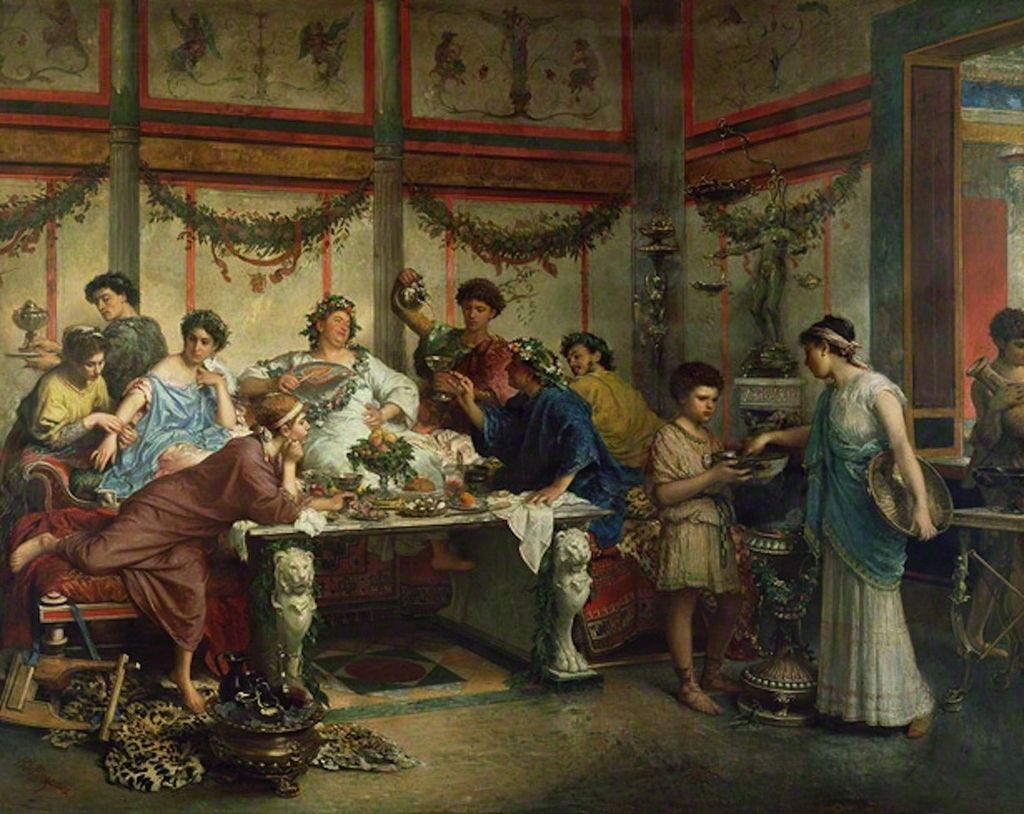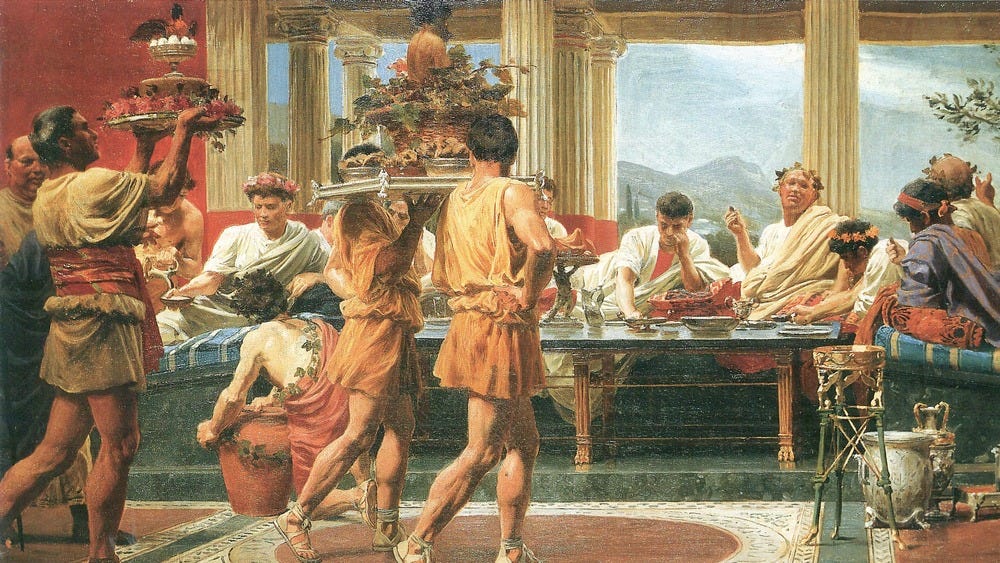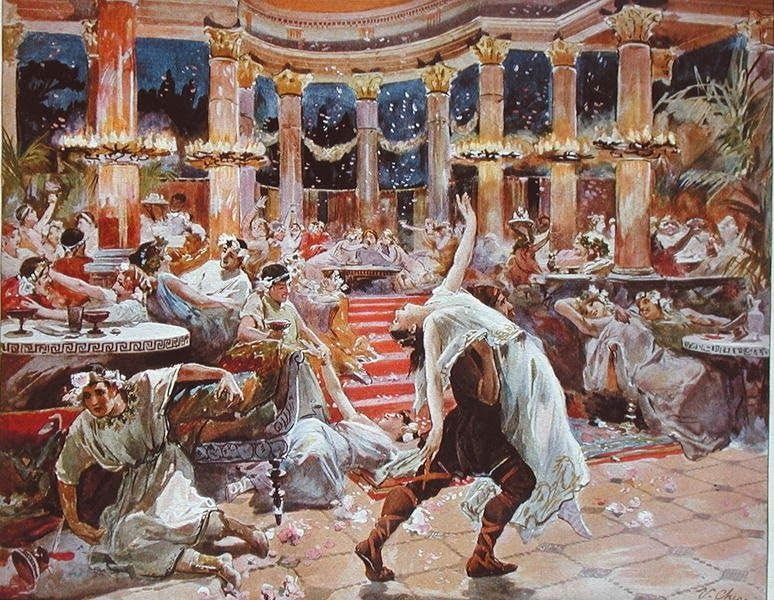Pleasure, Greed, and Spiritual Decline
Hedonism in Rome and Europe
This piece by Dr. David Engels is part of multi-part series, Rome Reloaded, exploring the striking parallels between ancient Roman society and our own. Enjoy!
Anyone looking for striking parallels between the present and antiquity will sooner or later come across the term “late Roman decadence” and therefore tend to believe that he will find what he is looking for in late antiquity. Now, a certain tendency to “dance on the volcano” is typical of pretty much every “fin de règne”, i.e., that late and transitional period in which a regime sees its end inevitably approaching but can still dispose of its accumulated power for a short while, largely using it for self-gratification shortly before its downfall — think, for example, of the “Régence” between Louis XIV and Louis XV, the “fin de siècle” before the First World War, or the late Weimar Republic.
However, when we look for deeper morphological parallels between antiquity and the Western world, we should focus not on temporary phenomena but on long-term trends. Analogies between the present and late antiquity are therefore less useful than those between us and the late Roman Republic in the 1st century BC, when, in the words of the great Augustan historian Livy, the Romans “could no longer bear their vices nor their virtues”, while “a desire arose to destroy themselves and everything else.”
Reminder: you can get tons of useful members-only content and support our mission for a few dollars per month 👇
Two full-length, new articles every single week
Access to the entire archive of useful knowledge that built the West
Get actionable principles from history to help navigate modernity
Support independent, educational content that reaches millions
Societies reveal a lot about themselves through their approach to prosperity, consumption, and self-realization. In the Roman 1st century BC, a time of political decay, internal violence, territorial expansion, and growing disorder, the previous orientation of society toward the common good and the egalitarian cohesion of the elite were replaced not only by the boundless ambition of great individuals, but also by private excesses, the pursuit of luxury, and the dissolution of traditional moral rules—a moral bankruptcy masked by outward glamour. Much more than late antiquity, which was marked by Christianization, barbarization, impoverishment, and failing bureaucracy, it is the late Roman Republic that strikingly resembles the consumption-saturated, fun-oriented, and individualistic late modern West.
Of course, we must unquestionably distance ourselves from the spectacular caricatures of the novels and historical paintings of the 19th century or the “peplum” films of the 20th century. Without any doubt, just as in the centuries before and after, there were countless people among the broad masses who simply went about their duties and experienced the decadence of the elite and the shipwreck of the republic as something that took place only on the periphery of their perception, affecting them at most when it came to tax increases or actual fighting in the streets or the battlefield.
Nevertheless, this persistence of normality should not lead to the erroneous conclusion that complaints about decadence are merely “elite discourse” or even a mere literary platitude without any real significance: The ubiquity of this theme in poetry, philosophy, and historiography, and not least its presence in legislation, shows that, at least in the intellectual self-perception of the Romans, moral decline played a decisive role in understanding the crisis of their republic and must therefore be taken very seriously by us as well.
From Republican Ethos to Decadent Egoism
Even in the late 3rd and early 2nd centuries BC, Rome's republican elite was largely shaped by the ideal of “virtus”: a sense of duty, modesty, self-restraint, and commitment to the res publica were the omnipresent political guidelines. Cato the Elder lived a deliberately simple life, preferred a field flask to a wine cup, praised thrift, warned against Greek philosophy, and despised luxury.
However, with increasing wealth from the provinces, the success of expansion, and social decoupling from the impoverished masses, a new nobility emerged whose goal in life was no longer the common good but their own prestige, and whose moral guidelines were completely confused by the influx of various skeptical, critical, or hedonistic Eastern schools of philosophy. Sallust already complained in his writings that young people sought nothing but pleasure, games, and jewelry; Lucullus, one of the most famous generals of his time, returned from the East with a fleet full of delicacies, slaves, and works of art, and had a garden palace built in Rome whose parties were legendary; Crassus combined the resources of politics, provincial administration, and joint-stock companies as never before to become the richest man in Rome; etc.
At the same time, the social divide was widening: while the upper classes diverted the riches of the provinces into their own coffers and reveled in excess, the common people lived from hand to mouth in the insalubrious tenements of the metropolis of Rome. “Bread and circuses” became a mechanism of mass sedation, not social integration; the political farce surrounding the consulates, tribunates, and the office of praetor no longer served the good of the republic, but rather the horse-trading of a few powerful families. No wonder that social reformers of the Gracchi family indulged in dystopian descriptions such as the following:
“The wild animals that populate Italy have their dens, and for each of them there is a place to hide, a refuge. But the men who fight and die for Italy have nothing but air and light; restless, without a house or home, they wander about the country with their children and wives. The generals lie when they call on their soldiers in battle to defend graves and shrines against the enemies: none of these poor Romans has a father's altar, none a grave for his ancestors. They fight and die for the comfort and wealth of others. They are called masters of the world, but in reality they do not own a crumb of earth.” (Plutarch, Tib. Gracchus 9)
Pleasure as the Meaning of Life
Parallel to the political disintegration, there was also a moral one. The literature and philosophy of the time amply reflect the shift toward self-centeredness. Epicurean, cynical, and skeptical schools, popularized by thinkers such as Lucretius, gained influence, preaching pleasure, tranquility, doubt, equanimity, and a departure from public engagement. Horace recommended: Carpe diem — seize the day, for life is short. Ovid wrote entire treatises on the art of love and the pleasure of seduction — the Roman Kama Sutra. Poets such as Catullus, Propertius, and Tibullus sang of their love for women of the demi-monde and mocked ideals such as patriotism and military prowess.
The self, the body, and desire became the center of the world, replacing the family, the state, and piety. The popular festivals of the time — especially the Saturnalia — turned into frenzied excesses. Plays became more vulgar, gladiatorial games more brutal, orgies wilder; the display of wealth, luxury, and excess was no longer a cause for shame or even public censure, as it had been in the past, but became a veritable political duty in order to dazzle the mob and win it over to one's side. As already shown elsewhere, this led not only to the decline of the traditional family, but also of the religious system, and the Romans' sense of the rule of law. The desire for excitement, for transgression, for self-gratification became the final driving force of a society in decline.
The political consequences were devastating: a society that is focused solely on self-interest, possessions, and self-realization will sooner or later lose its capacity for solidarity, resilience, and self-sacrifice. The republic soon found itself without defenders in the civil wars because no one was willing to stand up for it, not only because most citizens had lost their sense of community, but also because that community had reduced itself to absurdity over decades and lost all credibility through its corruption. Caesar marched with his few legions not only into a largely apathetic metropolis, but also into a spiritual vacuum: Rome was gutted from within before the republic collapsed politically, because the Senate had become a place of empty rituals, citizens only gathered when it was time for grain distributions or games, and even the most talented preferred to retreat to their summer homes out of disgust or lethargy rather than wear themselves out in the service of a corrupt republic.
Europe Today: The Self at the Center
Is it even necessary to emphasize the parallels with the present, given that so much has already been written about the moral decline of late modern Europe? Intellectually prepared since the fin de siècle and already implemented in crisis times such as Weimar, the pursuit of uninhibited self-realization became the supreme ideal of the entire Western world by the 1960s at the latest, when the last remnants of the old world had completely disintegrated in World War II. Family, faith, state, tradition — all these bonds were devalued; only the individual was to count, constantly reinventing themselves, enjoying their physicality, and “realizing” themselves radically and unrestrainedly. Since then, the media, advertising, education, and politics have repeatedly preached the same, purely self-centered mantra: Be yourself, follow your path, live your dream — until today.
Late capitalist consumer society supports this program with a constant stream of new offers. Whether it's eroticism, entertainment, fashion, body worship, tourism, wellness, or lifestyle — everywhere, people have become consumers of themselves and turned away from any kind of transcendence. Shopping malls are temples of consumption, gyms are cathedrals of self-optimization, clubs are cult sites of hedonism. At the same time, however, psychological stress is on the rise, with burnout, depression, loneliness, and identity crises becoming commonplace. Unbridled individualism is thus destroying what has been the secure foundation of the self for centuries: relationships are becoming unstable, families are breaking down, friendships are becoming utilitarian, religious beliefs seem incomprehensible, and patriotic solidarity is becoming obsolete.
As in late Rome, today's society is losing its morality and its ability to set collective goals: political debates revolve around individual rights, not duties; the willingness to get directly involved on behalf of others is declining or becoming a distant ideal; the welfare state is exploited but not supported; democracy is expected but not defended. The ideal of the citizen has also changed. In the past, citizens were bearers of responsibility; today, they are recipients of benefits.
The Consequences
The worst thing about this development is that no one would really deny it, but no one would want to return to the past and give up their uninhibited individualism, since the old ideals have been reduced to absurdity and thus lost their credibility, while their ultimate foundation — belief in transcendence — is hardly comprehensible to most people anymore.
No wonder, then, that pseudo-religious hysteria and radicalism are flourishing on the fringes of society and that ultra-libertarian, socialist, or climate apocalyptic ideologies are emerging, which, like all fashion phenomena, have their respective heyday, but all ultimately converge in their radical anti-traditional materialism and are used to ideologically underpin increasingly obvious social polarization. For let us not be mistaken about one thing: whether under the banner of liberalism, socialism or environmentalism, it is always the broad masses who are excluded from participating in the wealth of the economy as a whole in the name of lofty ideals, while billionaires, party officials, and climate saviors claim privileges and lifestyles for themselves that are in no way inferior to the luxury of the late republican elite in their material opulence and moral decadence.
While Lucullus' villa, Caesar's sexual excesses, and the feasts of the young Octavian became symbols of an elite that had disconnected itself from the people, today many are outraged by the self-centeredness of a globalist upper class that has long since isolated itself from the citizens and is hardly credible in its hyper-moral self-promotion. Asymmetrical financial crises, systematic tax avoidance, political aloofness, moral depravity, and self-satisfied media adulation have shaken confidence in the integrity of the elites, both then and now, thereby undermining the credibility of the republican ethos that this upper class claims to represent. One may obey such an elite for a time out of fear, but no one will willingly sacrifice themselves for it. This ultimately brought about the downfall of the Roman Republic and will probably sooner or later bring the modern West to the brink of collapse.
This text has first been published in the German language on “Corrigenda” and serializes updated elements from the book by the same author: “Auf dem Weg ins Imperium? Die Krise der Europäischen Union und der Untergang der römischen Republik. Historische Parallelen, Berlin / Munich, 2014 (Europa Verlag Berlin), 544p.”





This is key:
“One may obey such an elite for a time out of fear, but no one will willingly sacrifice themselves for it.”